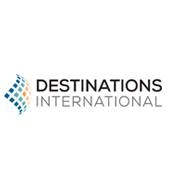Destination Marketing Association International Renamed as Destinations International

Destination Marketing Association International has been renamed, officially becoming Destinations International, effective July 13.
The new name was unveiled this week during the association’s Annual Convention in Montreal, Canada.
Several other announcements, including a partnership with the James Beard Foundation, Canadian engagement initiatives and the results from the Defining the Impact of the Weaponization of Travel and DestinationNEXT studies also were made.
“Our new name, Destinations International, reflects the new reality that we are so much more than just marketers of our destinations,” said Chairman Gary C. Sherwin, CDME and President and CEO of Newport Beach & Company.
He added, “We are destination architects, advocates and brand leaders, and our new name truly reflects our more broad and engaging mandate to serve our cities as economic generators.”
This rebrand was made possible through a collaborative eight-month rebrand process with Miles Partnership, based upon feedback gathered from stakeholder interviews and extensive analysis of key operational facets of the association.
“The Destinations International team is proud to introduce our new brand, which was made possible by the collaborative effort of our Board of Directors, the Miles Partnership team and through the feedback of our members,” said DI President and CEO Don Welsh Welsh.
He added, “Our new vision, mission and value proposition represent our commitment to provide our members with what they want and need to be successful.”
As Destinations International officially launched a new name, four new initiatives were also announced at Annual Convention:
Destinations International announced a newly established partnership with the James Beard Foundation, (JBF) which will focus on building relationships, value and engagement between JBF and key culinary destinations wishing to position themselves as gastronomic destinations to drive tourism. The alliance will first concentrate on destination engagement in support of JBF Taste America events, and Destinations International events and programs for both the Association and Foundation.
As the Association continues the momentum of expanding its international footprint, several Canadian engagement initiatives were announced. Destinations International entered into a strategic partnership with the Destination Marketing Association of Canada, allowing for the sharing of resources and collaboration on educational opportunities. Additionally, the Association will assist with the advocacy efforts throughout Canada.
In partnership with Tourism Economics, the Canadian Model of the Event Impact Calculator (EIC) will be made thanks to a grant from the Destinations International Foundation. Working collaboratively with Travel Alberta, the CDME program will be available beginning in 2018. Travel Alberta will offer two CDME sessions – one in the spring and one in the fall. Destinations International will also continue a dialogue with important industry partners, including: The Tourism Industry Association of Canada, Meetings Mean Business Canada and Destination Canada.
The Defining the Impact of the Weaponization of Travel Study, which was released as a joint effort from the Destinations International Foundation and the PCMA Education Foundation, explores whether travel boycotts and bans work to effect political change, what the long-term damage to a destination's brand is and what the life cycle of a boycott is. Key research objectives discovered through a survey of American Travelers from across the nation include a better understanding of the successes and failures of travel boycotts, the impact of boycotts on the travel and tourism industry and favorable alternatives. The study is complimentary and available to download here.
Also announced was the release of the DestinationNEXT (DNEXT) 2017 Futures Study, which is a Foundation-funded study that reports on the trends and opportunities that will shape the future of destination marketing and management.
The study is comprised of survey results from more than 400 destination organization experts representing 50 countries covering every continent. For more information on DNEXT and to download the study, click here.


Add new comment